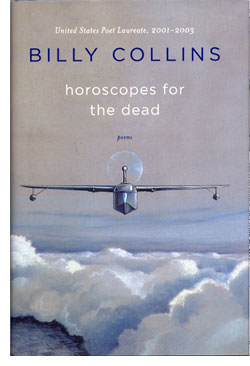 |
 |
 Billy Collins
Billy Collins
Horoscopes for the Dead
Reviewed by: Rick Kleffel © 2011
Random House
US First Edition Hardcover
ISBN 978-1-4000-6492-2
Publication Date: 04-05-2011
112 pages; $19.99
Date Reviewed: 04-09-2011
Index:
Poetry
Poetry maps your mind; reading great poetry actually changes the way you think. Language is born differently and words move through your mind with a measured cadence. Your perceptions will become sharper, your eye more acute after having read 'Horoscopes for the Dead,' the latest collection of poems by Billy Collins. Pick it up in the store and read any poem, then listen to your own thoughts. You're a different person. Your self-awareness will have a more defined shape. The world around you will be both simpler and more mysterious. And it will definitely be more fun.
Time is very much on the mind of Billy Collins in 'Horoscopes for the Dead.' Like many of our, or any time, he has arrived at that point in his life where his parents have passed away, and he finds himself taking their place while remaining their child. The poem "Grave," begins the book with Collins standing over his parents' graves, asking their opinion of his glasses — still the child. But as he muses on his own fantasy of a variety of silences, he encompasses their silent wisdom — and his child-like reaction needs no approval. It's sweet, funny and wise, each quality off-setting the others.
The title poem offers another meditation on death, as Collins humorously usurps the language of newspaper astrologers:
"Some days I am reminded that today
will not be a wildly romantic time for you,
nor will you be challenged by educational goals,
nor will you need to be circumspect in the workplace."
The friend to whom the poem is addressed is deceased, and Collins' final vision of him is a lovely leap into the infinite. Collins sensibility of time is subtle, flowing; yet in the gorgeous language there are bits of eerily realistic everyday life. He seems to have the ability to sense the world beyond the world while keeping both his feet on the ground.
The cadence of Collins' work is immensely powerful, but never overpowering. He knows how to carry the reader away with crystalline sentences and line breaks like the creases in leaves, natural and organic. But he does indeed change the way we perceive the world. There's a measured tone to every poem here, as he delicately leads the reader out of the reality we touch and into the world that we feel. His poems only rarely use the elements of the unreal, but the twists he takes and the associations he makes require a similar acceptance of the fantastic.
Charm is one of Collins' strengths, only because he underplays it so well. In "The Straightener," we meet an obsessive man who has found a way to avoid speaking his feelings. Collins has pioneered a new sort of love poem, one that describes the difficulties of having a relationship while admitting the attraction. His love poems are an uneasy embrace of opposing ideas, with spiky reminders embedded in unloving language. Numerous poems address his relationships with his dogs, bringing out a boyish, impish man for whom age and maturity have strict limits, beyond which lies wonder.
And wonder is a key, if largely unidentified ingredient of Collins' latest collection. 'Horoscopes for the Dead' uses language to engage the world with a sense of wonder and an undercurrent of joy. There is true joy to be found in this life and Collins manages to do so with natural language that has been enchanted by his talent and vision. He's a bit of teenager as he writes, with poetic skills informed by his entire well-lived life. Collins uses that pull to boyhood perceptions to infuse the readers' experience of language with supple power.
Billy Collins has the knack of showing you himself and making you see yourself. It happens so simply, so quickly that it does not even seem like the magic trick that it is. Poetry is in many ways nothing less than the skill-set behind sleight-of-hand applied to words. Collins has a wry sensibility that lets him make quick leaps in subject and sharp turns in tone. You're reading one word while the rhythm of another lingers. When you start thinking in line breaks, the difference between the magic trick and the magic begins to seem like mere semantics. And that's when you know that poetry can indeed, literally, change your mind.
|
 |
|
|
 |
| |
Review Archive
All Reviews alphabetized by author.
General Fiction
Non-Genre, general fiction and literature.
Horror
Supernatural fiction, supernatural horror and non-supernatural horror.
Science Fiction
Science fiction, science fantasy, speculative fiction, alternate history.
Fantasy
Fantasy, surrealism and magic realism.
Mystery
Crime, thrillers, mystery, suspense.
Non-Fiction
Non-Fiction, True Crime, Forteana, Reference.
Poetry
|
|
 |
|




